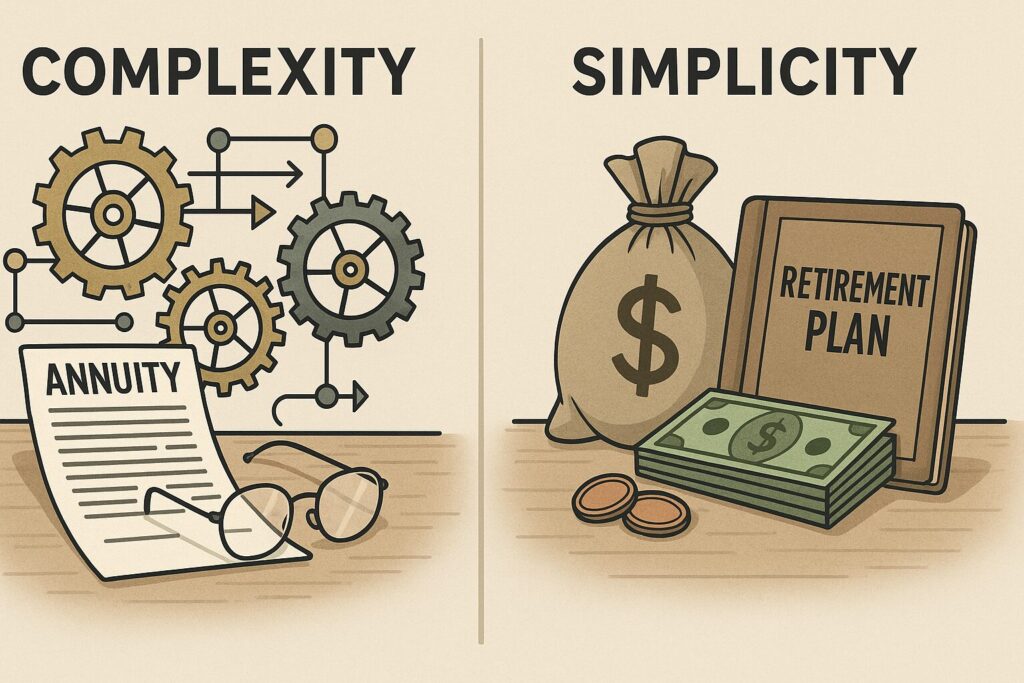
Why Financial Simplicity Is Often the Smartest Choice
Welcome to “Money Myths Retirees Still Believe”—a blog series that uncovers the hidden beliefs that can quietly sabotage your financial peace of mind.
Many retirees cling to common money myths that seem true but can lead to poor decisions, lost income, or unnecessary worry. Each post in this series explores one myth—like “cash is trash” or “I need to beat the market”—and replaces it with a smarter, simpler mindset.
If you’re retired or nearing retirement, this series will help you reassess your approach and feel more confident about your financial future.
The Myth: “If It’s Complicated, It Must Be Better”
A few years ago, Carol, a retired nurse, sat across from a financial advisor who handed her a thick packet filled with charts, fee tables, and contract pages. “This product is designed to offer protection and market participation,” he said, sliding the paperwork toward her. It was a variable annuity—something she didn’t fully understand, but it sounded sophisticated.
“If it’s this complex,” she thought, “it must be smart.”
Carol’s story is all too common. Many retirees fall into the trap of thinking that complicated equals better—that the more jargon, moving parts, and bells and whistles, the more advanced and effective the strategy must be.
But here’s the truth:
👉 In retirement, simplicity often wins.
Why We Fall for Complexity
It’s human nature. We assume a luxury car must be better than a basic one because it has more features. So when we hear terms like “buffered ETFs,” “structured notes,” or “deferred hybrid annuity contracts,” it sounds impressive—especially when explained by someone in a suit using a laser pointer.
But here’s the problem: the more complex a financial product is:
- The harder it is to know what you’re really getting.
- The more likely it is to include hidden fees or confusing terms.
- The less control or flexibility you may have if your needs change.
Worse, complexity often masks underperformance or high costs.
A Smarter, Simpler Mindset
You don’t need a financial product with 30 pages of fine print to have a safe and successful retirement. In fact, the best retirement strategies are often surprisingly boring.
And that’s a good thing.
Think about these simple (and effective) tools:
- A balanced portfolio of low-cost index funds or dividend ETFs.
- A ladder of investment-grade bonds that mature when you need cash.
- A basic immediate annuity that pays you a guaranteed monthly income.
- A cash reserve for emergencies.
These aren’t flashy. They won’t impress anyone at a cocktail party.
But they’re easy to understand, easy to manage, and proven to work over time.
A Real-Life Win with Simplicity
Tom, a 68-year-old retiree, used to tinker constantly with his portfolio—chasing high-yield stocks, testing fancy option strategies, and trying to “outsmart” the market.
Then he hit a rough patch and realized he was spending more time managing his money than enjoying retirement.
He simplified.
Now, his money is spread across three simple buckets:
- Cash for short-term needs
- Income-producing funds for steady monthly payouts
- Growth investments for the long haul
No guesswork. No stress. And he’s never felt more financially secure.
The Takeaway
If someone has to spend 45 minutes explaining how a product works—or you need a dictionary to understand it—it’s probably not the best fit for retirement income.
Complicated doesn’t mean smarter.
Confusing doesn’t mean better.
And boring doesn’t mean bad.
In fact, when it comes to retirement, boring can be beautiful.
Because the goal isn’t to impress anyone. The goal is to sleep well, enjoy life, and know that your money is working quietly in the background—without surprises.